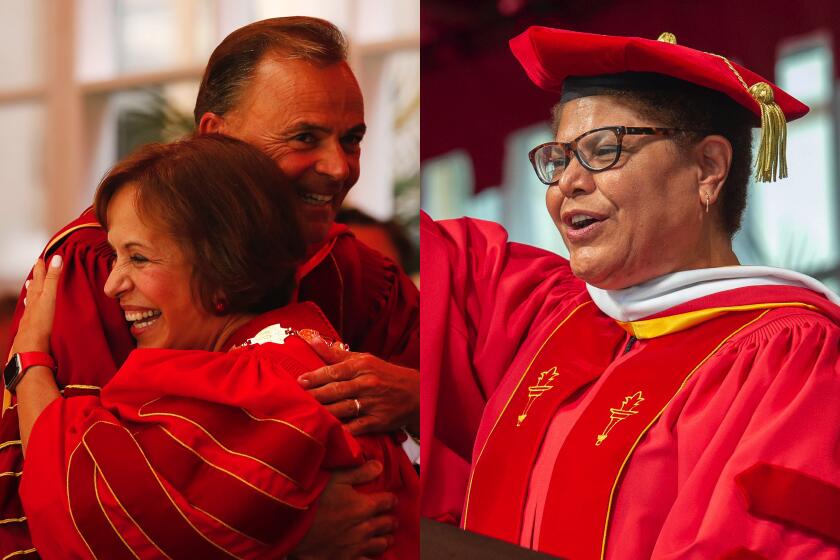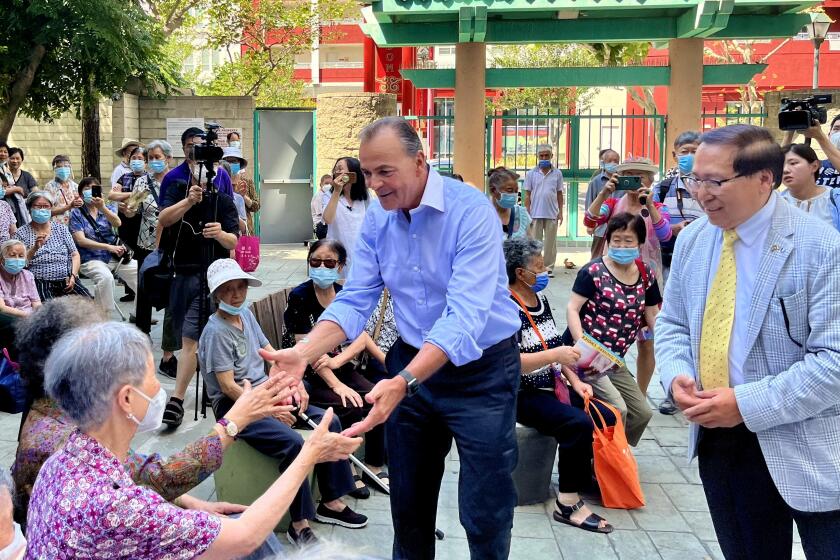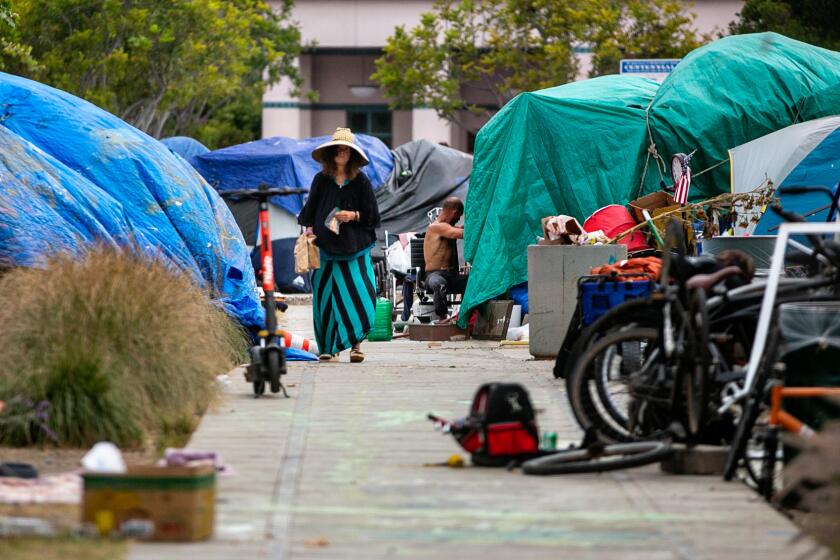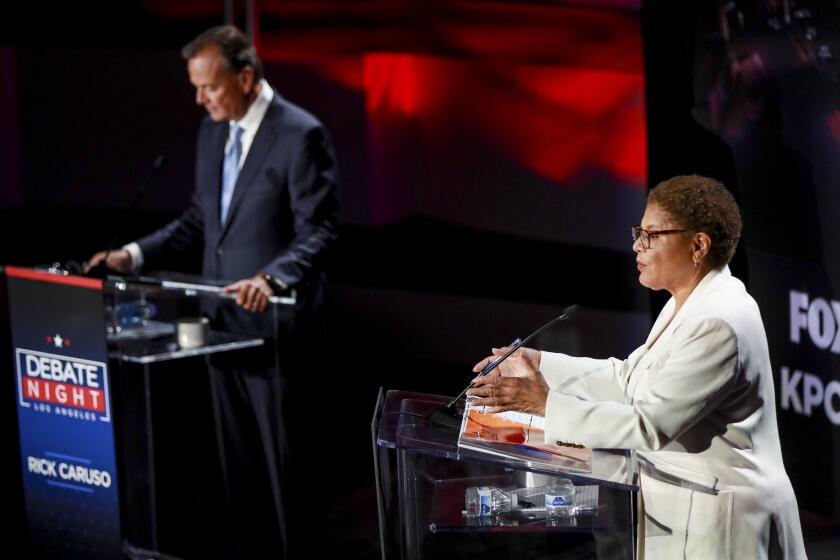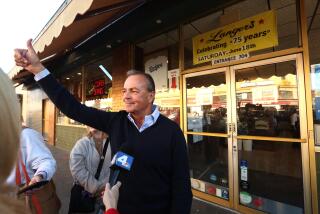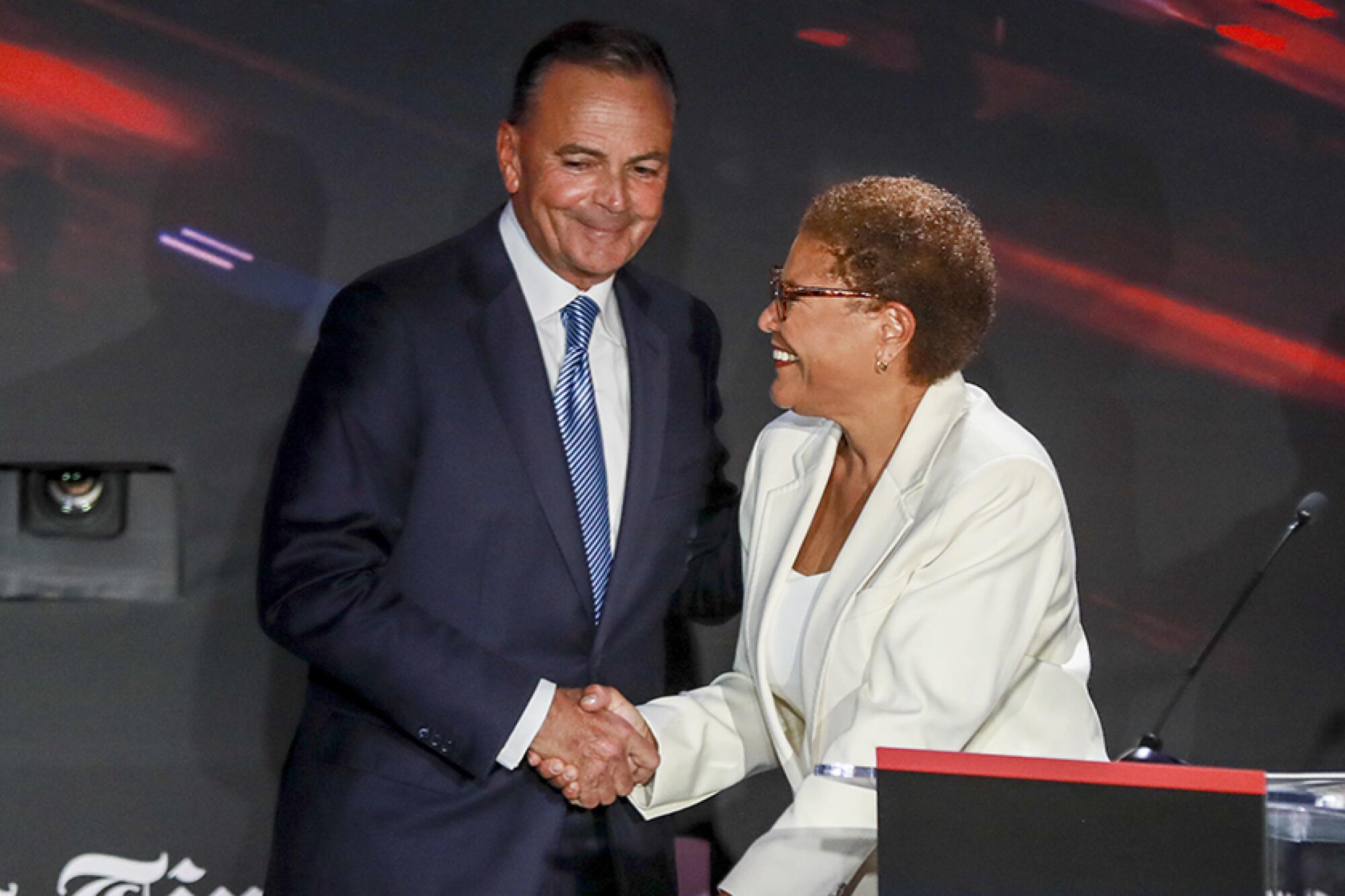
- Share via
Rick Caruso has made significant progress in the race for mayor, closing a large part of the gap with Rep. Karen Bass since August, but the billionaire businessman still trails by double digits among the people who are likeliest to vote.
Those findings from the latest UC Berkeley Institute of Governmental Studies poll, sponsored by The Times, highlight key dynamics as the mayoral race heads into its final weeks:
Bass, backed by most of the elected Democratic leadership in California, has a strong hold on her fellow partisans, who make up the bulk of the Los Angeles electorate. Caruso, backed by tens of millions of dollars from his personal fortune, has a path forward, but one that depends on getting potential supporters who are not frequent voters to show up for a mayoral election with few other major draws on the ballot.
Still, Caruso, whose ubiquitous visage recently returned to the region’s airwaves, has gained ground from a month ago. Among all registered voters, he’s now behind by just 3 percentage points, 34%-31% — within the poll’s margin of error. That’s down from a 12-point gap in August.
Among likely voters, however, Bass continues to lead by 15 points, 46%-31%, down from a 21-point lead a month ago.
Determining which voters are likely to turn out in an election is a complicated task for pollsters. The Berkeley poll, which was accurate in the June primary, defines likely voters as those who have a history of voting in recent elections and who indicated they were highly interested in voting this fall.
Those likely voters tend to be older, richer and whiter and are more likely to be registered Democrats and to identify as strongly liberal than the electorate as a whole.
“The actionable information in a poll is with likely voters because elections are decided by people who actually vote,” said Bill Burton, a Democratic strategist and former aide to President Obama who worked on Councilman Joe Buscaino’s mayoral campaign and is supporting Bass.
The path forward for Caruso, the poll suggests and outside analysts concur, is to push up turnout among voters who so far appear less interested in the race.
That would include many Latino voters, whose engagement in the race so far lags behind other groups. Caruso and Bass are running close to even among Latino voters, while Bass has a large lead among Black voters — she’s one of only two Black members of the Los Angeles congressional delegation — and among white voters.
Caruso has a well of potential support among voters who have cast ballots in at least some previous elections but whose level of interest in the race was too low for pollsters to deem them likely voters. Angelenos who voted in at least one previous election and said they were only moderately interested in voting favored Caruso over Bass 33%-14% with about half undecided. A similar margin held among respondents who indicated they had a low interest in voting.
Caruso brings several major assets to the effort to motivate those voters: This fall he is slated to spend at least $20 million on TV advertising, according to data from media tracking firm AdImpact. He has also invested heavily in a canvassing and door-knocking operation aimed at motivating less engaged voters. Those operations are firmly focused in communities that are predominantly Latino — like Boyle Heights and the east San Fernando Valley.
Karen Bass and Rick Caruso are attacking each other’s character and ethics, particularly when it comes to their alma mater.
Working against him is a history of fairly low turnout in municipal elections and a lack of other compelling races on the ballot. Although there are several contested congressional elections in the region, none are in the city of Los Angeles, and most of the statewide races in California do not appear competitive.
“I don’t think there’s any reason for anybody to show up in this election who isn’t organically already going to show up in this election. What I mean by that is if you’re not always voting, you’re not showing up,” said Orange County pollster Adam Probolsky, who does extensive work in the city, including polls of the mayoral race and research for opponents of a property sales tax that will be on the November ballot. The proceeds of that proposed tax, which Caruso opposes and Bass hasn’t taken a position on, would mostly fund the construction of housing for homeless and poor Angelenos.
Latino voters show a stark gap between those who are engaged in the race and those who are not. Bass leads 36%-29% and is viewed more favorably among Latino likely voters; with the broader pool of all registered Latino voters, Caruso leads 34%-25% and has a slightly higher favorability.
A similar phenomenon plays out in the populous San Fernando Valley, where Bass and Caruso are essentially tied, 41%-40%, among likely voters, but Caruso leads by a dozen points, 40%-28%, among registered voters. In August, registered voters in the Valley favored Caruso by just 2 points.
In addition to reminding people he’s on the ballot and getting his supporters to vote, Caruso has begun to attack Bass relentlessly on the air and the web — for a scholarship she received to attend USC’s school of social work and a speech she gave at a Scientology event more than a decade ago. Bass has hit back in advertising of her own, trying to tie Caruso to the college admissions bribery scandal, which occurred when he was on USC’s board.
The current poll began surveying voters just as Caruso began his barrage of general election advertisements. That onslaught appears to have had an effect on Bass’ image in at least some key parts of the city.
In August, 61% of registered voters on the Westside had a favorable view of Bass. That number has dropped to 43% in the current poll, with 27% saying they had an unfavorable view and 30% saying they had no opinion.
Across the city, Bass is viewed favorably by 53% of likely voters and 40% of registered voters. Just a quarter of voters in either category have an unfavorable view of her.
“The negative advertising must be having some effect there,” said Berkeley IGS poll director Mark DiCamillo, who has been surveying California voters for decades.
“Whenever people are changing their minds about a candidate, it usually happens in two stages. It doesn’t go from ‘I like them’ to ‘I hate them.’ It goes from ‘I like them’ to ‘I’m not sure,’ and that’s where we are with the overall electorate — on the Westside anyways.”
Despite the drop in favorability, the survey found that voters perceived Bass to be more honest, ethical and experienced than Caruso, while the businessman was thought to be more fiscally responsible.
Rick Caruso has made significant progress in the race for mayor, closing the gap with Rep. Karen Bass considerably since August, but the billionaire businessman still trails by double digits among the people who are likeliest to vote.
Bass has focused on building her strength among Democrats and liberals — emphasizing her history as an advocate for abortion rights and characterizing her opponent as an interloper who only became a Democrat to run for mayor.
Caruso had been a Republican for much of his adult life. He says he switched parties because the GOP became too extreme. He insists he favors abortion rights and always has even though in the past he’s financially supported antiabortion politicians, including Sen. Mitch McConnell of Kentucky, the Republican Senate leader.
Even with Caruso’s $62-million outlay on this campaign and deep investments in turning out the vote, the composition and demographics of who shows up on election day or mails in ballots heavily favor Bass.
Among registered voters who are Democrats, Bass leads by about 25 percentage points, and among likely voters who are registered Democrats, she leads by nearly 40 points. This advantage among the city’s largest voting bloc has been in place since the primary.
One issue that potentially could still shake up the race, however, is homelessness, said Probolsky. Anger over the problem might bring infrequent voters to the ballot box, he said.
The poll found that voters feel homelessness has an effect on their lives and believe the mayor is capable of doing something about the crisis. Among likely voters, 91% said that homelessness affects their life directly or indirectly, and 55% said that the mayor can have a major effect in solving the crisis. Another 30% said the mayor can play only a minor role in solving Los Angeles’ homelessness problem.
Rep. Karen Bass and developer Rick Caruso talk about their approaches to the homelessness crisis and where the money would come from.
Bass has put forward a plan to bring 15,000 people indoors by trying to wring as much as possible out of the current system in order to expand interim and permanent housing.
That’s a far smaller scale than Caruso envisions. He wants to build 30,000 interim housing units in his first year in office. To realize this expensive plan, he wants to build tiny houses for 15,000 people and temporarily place another 15,000 people in “sleeping pods” in existing structures, such as warehouses and empty buildings.
Caruso continues to speak out loudly about the issue and attempts to tie Bass to policy failures of previous administrations and the growing count.
For voters, “there’s no reason for me to show up this election unless I’m passionate about always voting — with one caveat, and that is homelessness,” Probolsky said.
Rick Caruso has spent more than $62 million, nearly all of it his own money, in the L.A. mayor’s race, according to the latest filings.
“If that’s all he talks about between now and [election day], he could possibly bring some of those people to actually show up.”
The Berkeley IGS poll was conducted Sept. 22-26 among 1,688 Los Angeles registered voters, of whom 1,349 were deemed likely to vote in the November election. The sample was weighted to match census and voter registration benchmarks. Because of weighting, precise estimates of the margin of error are difficult, but the results are estimated to have a margin of error of 3.5 percentage points in either direction for the full registered voter sample and 4 points for the likely voter sample.
More to Read
Sign up for Essential California
The most important California stories and recommendations in your inbox every morning.
You may occasionally receive promotional content from the Los Angeles Times.
